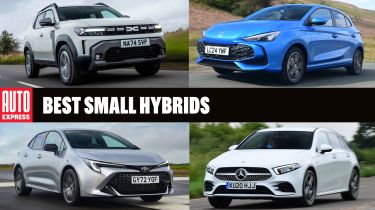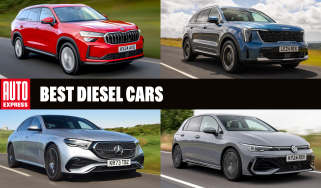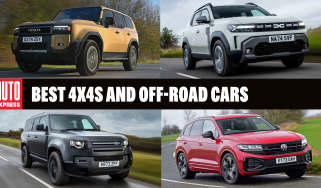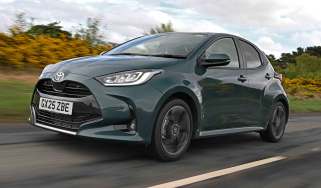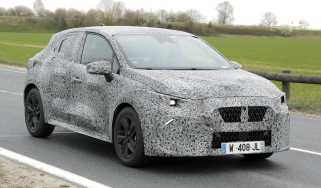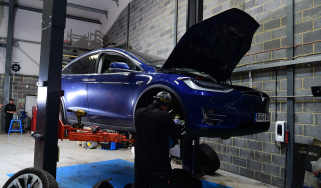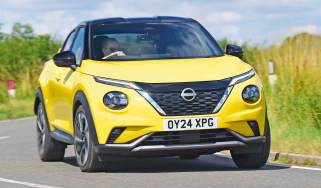Best small hybrids on sale 2025
Do you need good fuel economy, but don’t want a large PHEV? Here’s our list of the best small hybrids on sale in the UK
Small hybrid cars aren’t exactly common. We already have lists of the best hybrid cars and best plug-in hybrid cars on sale in the UK today and throughout those breakdowns, a common theme emerges. The vast majority of hybrid and plug-in hybrid vehicles on sale now are based on larger SUVs and saloon cars, which sit towards the higher end of the market in terms of size and price.
From an engineering perspective, this makes sense. The extra space available under the floor and around the rear axle of a large SUV makes it perfectly suited to accepting the extra battery packs and electric motors required for a hybrid powertrain. But, what if you live in a city and simply don’t require the extra ground clearance or practicality? What if your budget can’t stretch to one of these family sized hybrid cars?
To help you find the right car, we’ve put together a list of the best small hybrid cars on sale now, all of which offer a refreshing blend of fuel economy and city-friendly dimensions; we’ve primarily stuck to superminis and small family hatchbacks here, which tend to be a little more affordable and deliver the best economy, where hybrid tech on large SUVs sometimes feels like tokenism.
Our run-down has a mix of hybrid and plug-in hybrid vehicles, both of which have their own benefits and drawbacks. Conventional hybrid vehicles don’t need to be charged to achieve their optimum fuel economy, but their electric range is limited.
PHEVs (Plug-In Hybrid Vehicles) are fitted with larger batteries and more powerful electric motors but, once their battery packs are depleted, that extra weight can see economy figures tumble – though usually only down to the level of conventional hybrids. Still, it’s something to bear in mind if you’re to buy a plug-in hybrid. The best results definitely come from charging as often as possible, and that’s all the more fruitful when some of the PHEVs below do well over 50 miles on a charge.
Compare the best small hybrid cars
Use this table to find our individual in-depth review ratings for the best small hybrid cars, along with our score for each car's MPG, CO2 and running costs. Scroll down or click the links to read more about each model...
| Rank | Car | Price from | Overall rating | MPG, CO2 and running costs (out of 5) | Max. WLTP combined efficiency |
| 1 | MG3 | £18,995 | 5 | 4.5 | 64.2mpg |
| 2 | Toyota Prius | £37,895 | 4.5 | 4 | 565.0mpg |
| 3 | Dacia Duster Hybrid | £24,830 | 4.5 | 4.7 | 55.3mpg |
| 4 | Renault Clio E-Tech | £21,895 | 4.5 | 4.5 | 67.3mpg |
| 5 | Toyota Yaris | £23,445 | 4 | 4.4 | 62.8mpg |
| 6 | Honda Jazz | £28,060 | 4 | 4 | 62.8mpg |
| 7 | Toyota Corolla | £30,795 | 4 | 4.1 | 64.1mpg |
| 8 | Volkswagen Golf eHybrid | £36,280 | 4 | 4 | 54.3mpg |
| 9 | Mercedes A250e | £41,165 | 4 | 3.8 | 353.2mpg |
| 10 | Jeep Avenger e-Hybrid | £26,229 | 4 | 4 | 57.6mpg |
1. MG3
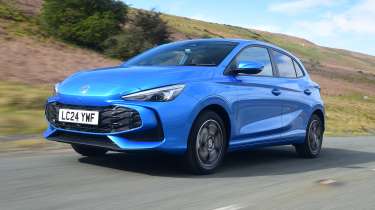
- Price from £18,995
- Best for value
| Pros | Cons |
| Great to drive | No reach adjustment for the steering wheel |
| Class-leading performance | Hybrid system is occasionally laggy |
| Strong efficiency | The MG brand’s low Driver Power score |
A hybrid supermini’s a curious place to find a performance bargain, but for under £19,000 the MG3 gives you 192bhp, and 0-62mph in eight seconds flat. Cast your mind back to the 1990s and 200 horses for twenty grand used to be the preserve of the Subaru Impreza Turbo. Not that the MG3 quite squares up to the rallying legend for driver appeal, but then the Impreza was rather more thirsty than the MG3’s 64.2mpg combined, too…
The MG3 isn’t without fault, with an interior that’s not as appealing as the similarly-sized Renault Clio’s, and the MG brand’s dubious last-place finish in our 2024 Driver Power customer satisfaction survey. But smooth, strong performance (the MG3 operates mostly using its electric motor, rather than the combustion engine), grippy handling, refined ride and easy-to-use infotainment all go a long way to making up for it.
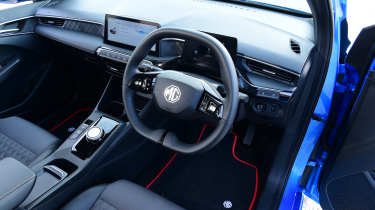
“The MG3 is among the most fun to drive, comfortable and best-equipped cars in its class. It’s also easily the fastest while returning strong fuel consumption figures.” – Alex Ingram, chief reviewer, who road tested the MG3 in the UK
2. Toyota Prius
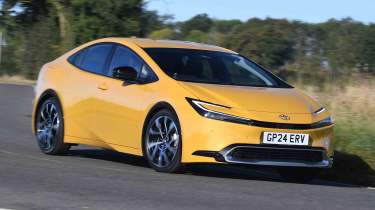
- Price from £37,895
- Best small hybrid car overall
| Pros | Cons |
| Excellent performance | Firm ride with 19-inch wheels |
| Fuel-efficient powertrain | Poor cabin practicality |
| Cabin comfort | Odd position of the driver information display |
The original hybrid is still a top buy – though today’s fifth-generation Prius is a very different beast to the gawky-looking original of the late 1990s. In fact, you might even call it genuinely desirable. So much so that after Toyota originally planned not to bring it to the UK, enough people expressed an interest in the car for the company to change its mind.
So how different is the modern Prius? Well, check out that styling for a start. But the provision of a 2.0-litre plug-in hybrid drivetrain with 220bhp and a sub-7-second 0-62mph time certainly helps, as does surprisingly composed handling. Really though you’ll buy the Prius for economy, and a 40-mile electric range is only part of the story here; we’ve seen economy as high as 80mpg even with a flat battery.
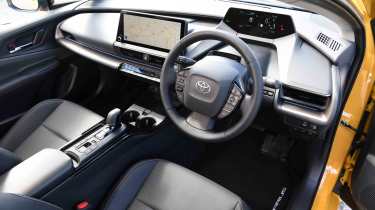
“While the Prius is no sports car, as with other Toyotas developed off the TNGA platform, it does a fantastic job of balancing comfort and agility on all kinds of roads.” – Alex Ingram, chief reviewer, who road tested the Prius in the UK
3. Dacia Duster Hybrid
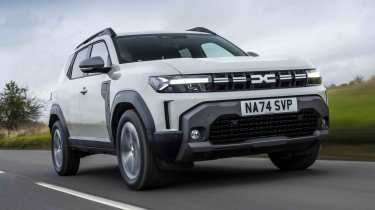
- Price from £24,830
| Pros | Cons |
| Comfortable ride at all speeds | High boot lip |
| Spacious and well-designed interior | Wind noise at higher speeds |
| Desirability | So-so Euro NCAP rating |
The Duster has become more sophisticated in its latest generation, but value is still at the top of its agenda. While the hybrid isn’t the most affordable variant, a starting price of under £25,000 for an SUV that’ll handle family duties while returning an official 55.3mpg is pretty good going, even compared to the other hybrids on this list.
Something else the latest Duster does well is not feeling like a second-rate product. The old Duster was charming but fairly easy to tell where costs had been cut. This time around the Duster hides its bargain status cleverly, with some flair to its design both inside and out. Ride comfort is good too, and while it’s not the sharpest handler, it’s far from wayward. Basically, it’s been well thought out in almost every aspect.
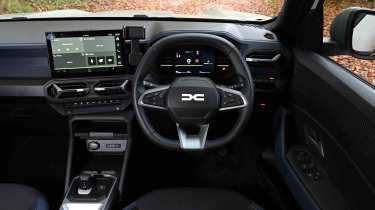
“During our time behind the wheel of the Duster Hybrid we averaged 52.3mpg – not far shy of the official WLTP figure of 55.3mpg.” – Alex Ingram, chief reviewer, who road tested the Duster Hybrid in the UK
4. Renault Clio E-Tech
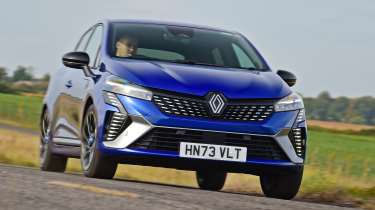
- Price from £21,895
| Pros | Cons |
| Striking new look | Rear space is a little tight |
| Lots of equipment | Noisy petrol in hybrid models |
| Great to drive | Slow pure-petrol version |
The Renault Clio is one of the best superminis around right now. It rides and handles well, is handsome to behold, and has an interior that both looks and feels high-quality. It also offers one of the best infotainment systems in its class – a Google-based arrangement that’s intuitive to use, but also, one that Renault hasn’t felt the need to cram umpteen minor controls into; you still get knobs and switches for the climate control, for instance.
The Clio also happens to have a hybrid version, with a 1.6-litre petrol engine and dual-motor setup for a useful 143bhp and 205Nm of torque. A 0-62mph time in the low-9-second range isn’t bad, but the bigger benefit is the claimed 67.3mpg combined figure. Some versions of the Toyota Yaris (below) are marginally quicker, a little smoother, and a little more economical, but the Clio’s the more appealing and accomplished car overall.
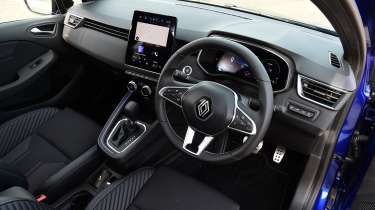
“The full-hybrid Clio E-Tech offers impressive fuel economy and zippy EV-like performance around town” – Ellis Hyde, news reporter, who drove the Clio in the UK
5. Toyota Yaris
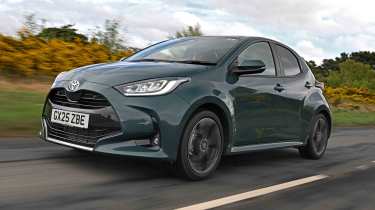
- Price from £23,445
| Pros | Cons |
| Great fuel economy | Not as spacious as rivals |
| Lots of standard safety features | Noisy engine when extended |
| Entry-level models are well-equipped | Firm suspension |
Toyota was one of the first to introduce a hybrid supermini with its first Yaris Hybrid back in 2012. Today, a hybrid drivetrain is the only one available in a Yaris, and predictably Toyota has honed it to a fine art. It’s not the best supermini overall – neither as good to drive as the Clio, or as good value as the MG3 – but for using as little fuel as possible, it’s hard to beat.
In WLTP testing the Yaris returns 68.9mpg, beating every non-plug-in hybrid on this page, and we’ve seen 65mpg in real-world testing; a figure the Yaris is happy to deliver in city driving too, where the economy of many cars drops steeply. The three-cylinder engine is best at lower speeds too, though it’s a shame the Toyota’s suspension isn’t a little softer to match its relaxed demeanour.
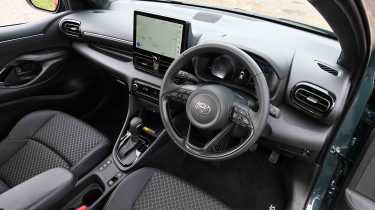
“The latest Toyota Yaris supermini is one of the best cars of its type in our view, helped by its stylish design, good fuel economy and plenty of kit thrown-in as standard.” – Max Adams, online reviews editor, who drove the Yaris in the UK
6. Honda Jazz
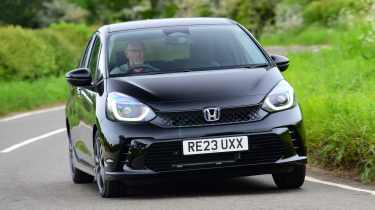
- Price from £28,060
- Best for practicality
| Pros | Cons |
| Efficient hybrid tech | Expensive to buy compared to rivals |
| Smart ‘Magic Seats’ layout | Messy infotainment |
| Practicality | Single engine option |
It’s very much a head-over-heart kind of car, the Honda Jazz. If you prioritise economy, practicality, and longevity above all else (and there are certainly worse things to wish for in a car), then the Jazz should be very near the top of your shopping list. Excitement, sleek styling, and engaging handling? Less so.
Like the Yaris, the Jazz used to have several engine options, but these days it’s hybrid-only – a 1.5-litre petrol with a pair of electric motors that makes 120bhp in its latest iteration, and can return up to 62.8mpg. The Honda’s killer feature though is its ‘Magic Seats’ arrangement, where the rear seats can flip flat, but the base can also fold upwards, to stash taller objects in the rear footwell. The cabin is classy and feels long-lasting, too; just as well, given the price.
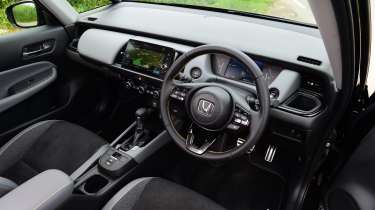
“The Japanese supermini’s hybrid powertrain is impressive, and if you prioritise practicality over style, it could be the right choice.” – Ellis Hyde, news reporter, who drove the Jazz in the UK
7. Toyota Corolla

- Price from £30,795
| Pros | Cons |
| Comfortable ride | Rivals offer more boot space |
| Precise handling | Limited rear passenger space |
| Solid build quality | No plug-in hybrid option |
It’s no surprise to find a third Toyota hybrid in this list, given the company has been making them longer than anyone else. It’s long offered a Corolla hybrid alongside the slightly wackier Prius, realising that not everyone wants the latter’s aero-first styling, though the current Corolla is quite a sharp looker itself, and actually pretty good to drive.
Toyota offers 1.8 and 2.0-litre hybrid setups, with 138bhp and a useful 193bhp respectively, the latter covering 0-62mph in 7.4 seconds. More importantly perhaps is economy: 64.1mpg for the 1.8, and 62.7mpg for the 2.0, in the base Icon spec (with the most efficiency-friendly wheel and tyre package). Another ace the Corolla has up its sleeve is an estate version, the Touring Sports, which is only a little less frugal and a little more expensive (starting at about £32,000, or £1,350 more than the hatch). It has up to 598 litres of boot space in 1.8-litre form.

“Thanks to great refinement, a comfortable ride, fantastic build quality and handling that’s precise and controlled – if not the last word in driving pleasure – there’s very little to dislike about the Corolla.” – Ellis Hyde, news reporter, who drove the Corolla in the UK
8. Volkswagen Golf eHybrid
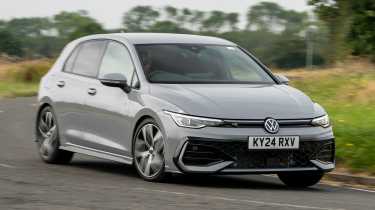
- Price from £36,280
- Best for EV range
| Pros | Cons |
| Vastly improved in-car tech | Some ergonomic niggles remain |
| Diverse powertrain range | Underwhelming cabin quality |
| Reassuring ride and handling | Road noise on larger wheels |
In the past if you wanted a fuel-efficient Volkswagen Golf, you probably bought a diesel. Due to err… fairly well-publicised events around a decade ago, VW adjusted its focus, and today plug-in cars are the main draw. Thus the Golf gets a plug-in hybrid model, and VW really hasn’t held back, as with up to 89 miles of pure EV range, few plug-in hybrids go further on a charge.
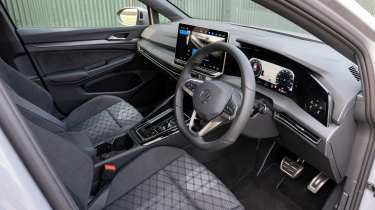
It’s significant for company users, as low CO2 and a long EV range put the Golf into just the 6% Benefit-in-Kind bracket. But for all Golf eHybrid drivers, you get WLTP economy of a barmy-sounding 1,000mpg. With a flat battery you can expect something more in the 50s and 60s, but the long EV range means the eHybrid is the de facto e-Golf. There’s even a sporty one: a 268bhp Golf GTE, which itself has 82 miles of EV range.
"Over time, Volkswagen has adopted the ‘if it ain't broke, don’t fix it’ approach for the Golf, and the German manufacturer has broadly followed this strategy with the eighth-generation model." - Alex Ingram, chief reviewer, who drove the Golf in the UK
9. Mercedes A250e
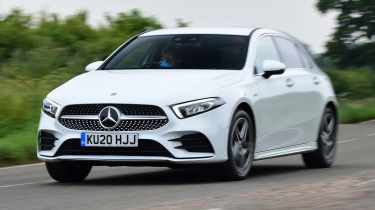
- Price from £41,165
| Pros | Cons |
| Gorgeous interior | Firm ride |
| Fantastic tech | Coarse 1.3 petrol engine |
| Efficient engines | Dull handling |
The Mercedes A-Class is effectively Mercedes’ take on a VW Golf, and that’s not meant to demean it. It’s a quality family hatch with plenty of tech, an interior design that still stands out seven years after its 2018 launch, and some highly-efficient engines (aided by excellent aerodynamics).
One of those powertrains happens to be a plug-in hybrid, with the A250e. It’s a 1.3-litre, four-cylinder turbocharged petrol (jointly developed with Renault) joined by an electric motor, for 215bhp, electric range of 52 miles, and WLTP economy of 353.2mpg. Okay, that’s not as spectacular as the Golf eHybrid, but it’s still not bad, and it’s among the smoothest A-Class models to drive too. Quite expensive, though.
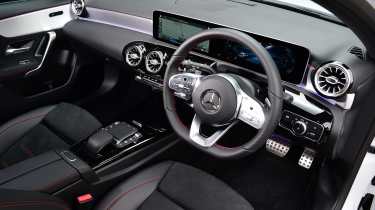
“Some rivals are more fun to drive and several are more comfortable, but the A-Class leads the class both in terms of refinement and efficiency.” – Ellis Hyde, news reporter, drove the A-Class in the UK
10. Jeep Avenger e-Hybrid
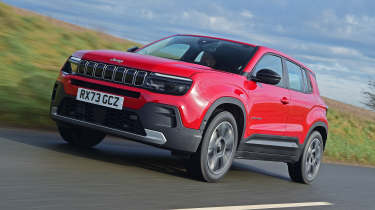
- Price from £26,229
| Pros | Cons |
| Charming and stylish | Minimal rear legroom |
| Great to drive in town | Cheap-feeling interior |
| Smooth transition between EV and petrol | Slower than the petrol model |
The Jeep Avenger launched in petrol and electric forms but in 2024 Jeep added an e-Hybrid model too. It uses the same 1.2-litre, three-cylinder petrol hybrid powertrain as all its siblings (Peugeot 2008, Alfa Romeo Junior, Fiat 600, Vauxhall Mokka and more) and added another string to the chunkily stylish Avenger’s bow.
Like those other hybrids on the same platform, economy is the goal here rather than any hybrid-assisted performance boost, since the e-Hybrid is actually a little slower than a petrol, manual Avenger. But 57.6mpg combined is a welcome figure, the 380-litre boot loses nothing to the petrol version, and it’s well-priced, being cheaper than some of the regular hybrid superminis on this list.
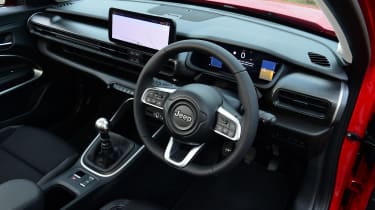
“On the road, the transition between petrol and electric is almost imperceptible – without the digital instrument cluster glowing blue, you really would be hard-pushed to tell when the engine drops in or out.” – Richard Ingram, deputy editor, drove the Avenger e-Hybrid on its launch in Italy.
Looking to buy your next car? Our dealer network has 1,000s of great value new cars in stock and available now right across the UK. Find your new car…

